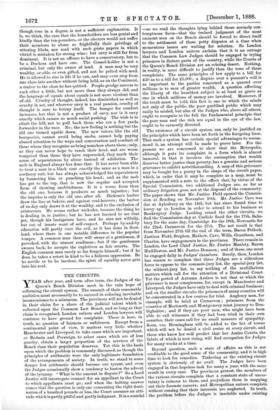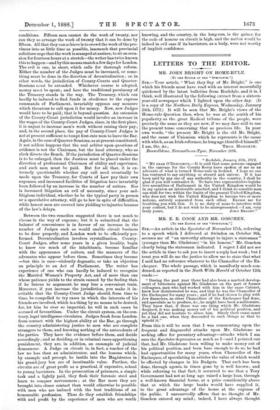THE CIRCUITS.
YEtiafter year, and term after term, the Judges of the llieen's Bench Division meet in the vain hope of reforming the circuit system. The summit of their reasonable ambition must necessarily be to succeed in reducing inevitable inconvenience to a minimum. The provinces will not be denied in their claim for a share of the judicial talent which is collected upon the Common Law Bench, and so long as that claim is recognised, London suitors and London lawyers will continue to have ground for complaint. There is here, in truth, no question of fairness or unfairness. Except from a sentimental point of view, it matters very little whether Manchester and Liverpool, to take cases which are important, or Bodmin and Presteign, to select cases which are of less gravity, obtain a larger proportion of the services of the Bench than their population deserves. Yet this is the basis upon which the problem is commonly discussed, as though the principles of arithmetic were the only legitimate foundation of the arrangements of society. In truth, we stand in some danger lest arithmetic should become our tyrant, and even the Judges occasionally show a tendency to hasten the advent of the tyranny. "What is the amount in disputer' So a Lord Justice will interrogate counsel for an appellant in the Court to which appellants must go; and when the halting answer comes that the question is only one concerning the right desti- nation of a hundred pounds or less, the Court assumes an atti- tude which is partly pitiful and partly indignant. It is a scandal
—so we read the thoughts lying behind those serenely con- temptuous faces—that the trained judgment of the most eminent men on the Bench should be forced to direct itself to the settlement of these petty disputes at a time when momentous issues are waiting for solution. So London lawyers and London suitors exclaim that it is an outrage that the Common Law Judges should be engaged in trying prisoners in distant parts of the country, while the Courts of the Queen's Bench Division are an echoing desert. Nothing, in reality, is more difficult to justify than the tone of these complaints. The same principles of law apply to a bill for 220 as to a bill for £5,000; a dispute over a peasant's will is as important to the parties concerned as a quarrel over millions is to men of greater wealth. A question affecting the liberty of the humblest subject is at least as grave as one in which millions of money are involved. Moreover, if the truth must be told, this fact is one to which the minds not only of the public, the poor purblind public which may easily be misled, but also of the Judges who, above all others, ought to recognise to the full the fundamental principle that the poor man and the rich are equal in the eye of the law, ought to be earnestly directed.
The existence of a circuit system can only be justified on the principles which have been set forth in the foregoing lines.
That such a system has certaiii special advantages to recom- mend it, an attempt will be made to prove later. For the present we are concerned to show that the Metropolis, although it puts its complaint in a form which is almost immoral, in that it involves the assumption that wealth deserves better justice than poverty, has a genuine and serious grievance to exhibit notwithstanding. A map of this grievance may be bought for a penny in the shape of the circuit paper, which, in order that it may be complete as a map, must be supplemented with a note to the effect that, by virtue of the Special Commission, two additional Judges are, as far as ordinary litigation goes, not at the disposal of the community.
The paper shows that Mr. Justice Field opened the Commis- sion at Reading on November 10th. Mr. Justice Cave was due at Aylesbury on the 14th, but has since found time to hurry up to London in order to attend to his business as Bankruptcy Judge. Looking round the other circuits, we find the Commission-day at Carlisle fixed for the 17th, Salis- bury for the same day, Cambridge for the 19th, Newcastle for the 22nd, Carnarvon for the 27th. The net result is that from November 27th till the end of the term, Baron Pollock, Justices Field, Stephen, Mathew, Cave, Wills, Grantham, and Charles, have engagements in the provinces. There remain in London, the Lord Chief Justice, Mr. Justice Manisty, Baron Huddleston, and Mr. Justice Denman ; and of these, one must be engaged daily in Judges' chambers. Surely, then, London has reason to complain that three Judges are a ridiculous force to oppose to the common-jury list, the special-jury list, the without-jury list, to say nothing of the multifarious matters which call for the attention of a Divisional Court Yet the period of Autumn Assizes is not that at which the grievance is most conspicuous, for, except in Manchester and Liverpool, the Judges have only to deal with criminal business ; and on the smaller circuits the prisoners of many counties will be concentrated in a few centres for trial. Anglesey men, for example, will be tried at Carnarvon ; prisoners from the counties of Merioneth and Montgomery must journey to Den- bighshire; and if they are poor men, who might have been able to call witnesses if they had been tried in their own counties, their cases call for no small measure of sympathy. Soon, too, Birmingham will be added to the list of towns which will not be denied a civil assize at every circuit, and those who know her well predict that her Assize Courts, the fabric of which is now rising, will find occupation for Judges for many weeks at a time.
Beyond question, such a state of affairs as this is not creditable to the good sense of the community, and it is high time to look for remedies. Tinkering at the existing circuit system is obviously of no avail. The Judges have been engaged in that hopeless task for many a year, with the same result in every case. The provinces protest, the members of the various circuits complain that a constant state of uncer- tainty is ruinous to them, and prejudices them in mapping out their forensic careers; and Metropolitan suitors complain without ceasing that their interests are neglected. In truth, the problem before the Judges is insoluble under existing conditions. Fifteen men cannot do the work of twenty, nor can they so arrange the work of twenty that it can be done by fifteen. All that they can achieve is to crowd the work of the pro- vinces into as little time as possible, insomuch that provincial solicitors urge that the work is scamped at assizes; to sit on occa- sion for fourteen hours at a stretch—the writer has twice known this to happen—and by this means snatch a few days for London. The evil is one, in short, which calls for thorough reform. Either the number of the Judges must be increased, or some- thing must be done in the direction of decentralisation ; or, in other words, the jurisdiction of County-Courts and Quarter. Sessionsmust be extended. Whichever course is adopted, money must be spent; and here the traditional parsimony of the Treasury stands in the way. The Treasury, which can hardly be induced to find funds in obedience to the express commands of Parliament, invariably opposes any measure which threatens to call upon it for money. Now, new Judges would have to be paid; that is beyond question. An extension of the County-Court jurisdiction would involve an increase in the wages of the County-Court Judges, since, in the first place, it is unjust to increase men's work without raising their pay ; and, in the second place, the pay of County-Court Judges is not at present sufficient to tempt first-rate men to leave the Bar. Again, in the case of Quarter-Sessions, as at present constituted, it not seldom happens that the real arbiter upon questions of evidence is not the Chairman, but the local attorney, who as clerk directs the Bench. If the jurisdiction of Quarter-Sessions is to be enlarged, then the Justices must be placed under the direction of professional Chairmen of ability and experience, and such men must be paid. But for all that, it is ex- tremely questionable whether any call need eventually be made upon the Treasury, for Courts of Law pay their own expenses, and increased facilities of litigation have invariably been followed by an increase in the number of suitors. Nor is increased litigation an evil of necessity, since your sad- litigious individual, whether he be the typical party in person or a speculative attorney, will go to law in spite of difficulties, while honest men are coerced into yielding to injustice because of the law's delays.
- Between the two remedies suggested there is not much to choose in the way of expense; but it is submitted that the balance- of convenience is in favour of an increase in the number of Judges such as would enable circuit business to be done properly, and London work to be efficiently per- formed. Decentralisation involves crystallisation. County. Court Judges, after some years in a given locality, begin to know too much of the inhabitants, become familiar with the appearance of suitors, and the manners of the advocates who appear before them. Sometimes they become —but this is rare—violently dogmatic, or take an objection on principle to an Act of Parliament, The writer has experience of one who can hardly be induced to recognise the Married Women's Property Act, and of more than one whose patience yields to the strain caused by the feeling that, if he listens to argument, he may lose a convenient train. Moreover, if you increase the jurisdiction, you make it in- evitable that the County-Court Judge should, from time to time, be compelled to try cases in which the interests of his friends are involved, which is a thing by no means to be desired, for, let him be ever so impartial, he will in such cases be accused of favouritism. Under the circuit system, on the con- trary, legal intelligence circulates. Judges fresh from London, from contact with the highest ability at the Bar, go through the country administering justice to men who are complete strangers to them, and knowing nothing of the antecedents of the parties. They have the evidence before them, and decide accordingly; and so deciding, or in criminal cases apportioning punishment, they are, in addition, an ensample of judicial demeanour. A Judge on circuit is, in fact, a teacher of the law no less than an administrator, and the lessons which, by example and precept, he instils into the Magistrates in his grand-jury box are of inestimable value. Farther, the circuits are of great profit as a practical, if expensive, school to young barristers. In the prosecution of prisoners, a simple task and a lightly paid, they flesh their forensic steel and learn to conquer nervousness ; at the Bar mess they are brought into closer contact than would otherwise be possible with men who are imbued with the best traditions of an honourable profession. Thus do they establish friendships with and profit by the experience of men who are worth
knowing, and the country, in the long-run, is the gainer, for the code of honour on circuit is high, and the nation would be indeed in evil ease if its barristers, as a body, were not worthy of implicit confidence.











































 Previous page
Previous page